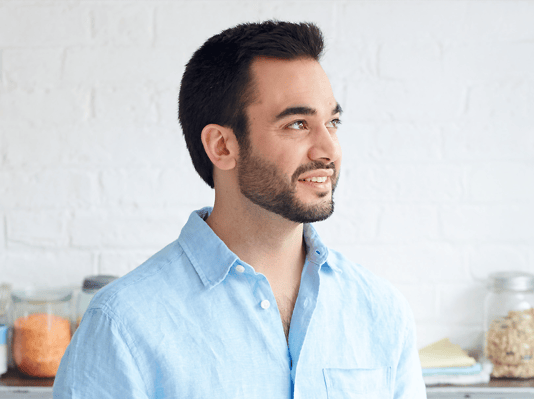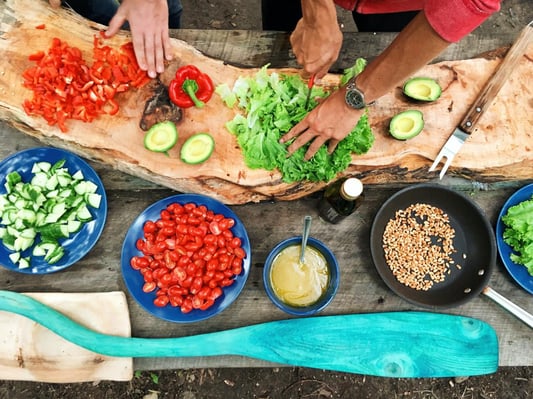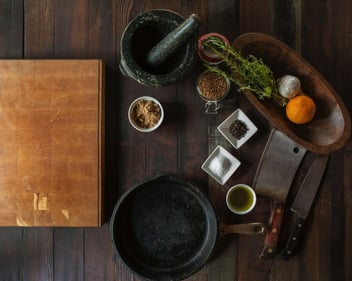
In the midst of a global pandemic, we may not be indulging in shared meals as we used to—catching up over coffee at a favorite cafe or dining out on a Saturday night. However, food writing—a genre that explores, not only the meals we eat, but the practices of growing, sourcing, monetizing, and sharing nourishment—allows us to share culinary experiences and insights in a new way. Below, Guest Judge, cookbook author, and food justice entrepreneur Limahl Asmall reflects on food (in)security, healthy eating on a “tiny” budget, and what he’s looking for in a winning competition entry.
1. Your work is especially focused on food security and equitable access to nutritious, nourishing meal options. Can you tell our young writers a little more about your philosophy, and why these issues matter to you?
Next time you share a good meal with a friend, watch their face as they take a bite: you might notice a satisfying sound of appreciation escape their lips, or you might see their eyes light up as their taste buds dance from the explosion of flavours. What’s universal is love of food. If you weren’t to experience good food, life would be all the more difficult. Not least because food sparks friendship and joy, but because food is the fuel that allows us to realise our potential in the world. It’s as vital as water and oxygen and gives us the building blocks for strong bodies and brains.
I’m the type of person that tries to help. Be it helping to cook great food on a tiny budget, or in my health app ‘IBS Coach’ which treats digestive issues through diet and health coaching. The golden thread that unites my projects is food. A good life starts with good food.
Food poverty is something wholly avoidable and yet for complex reasons not everyone has access to good produce, the resources to purchase, or the knowledge to cook good and nutritious meals. My work focuses on making good food more accessible to everyone, regardless of background, education, or monetary wealth.
2. From a writing standpoint, what are some of the lessons you learned while creating your first cookbook? In what ways does storytelling play a role in this type of food writing?
Cold hard facts are great but they quickly become boring without the human element. We need information to affect us emotionally for it to make an impact. There’s a good reason the ancient civilisations used stories to teach life lessons—it’s because they resonate with us on a personal level. I didn’t know any of this when writing my first cookbook, but looking back I had attempted to make an emotional connection through humour and playful introductions to each recipe.
I feel my recipe notes give a little bit of Me to each recipe and take the reader on a journey. You might want to know that the orange cake you’re about to eat is a secret family recipe passed down from my French partner’s great grandmother. Perhaps it would change the taste for you, too.

3. You mention on your website that your journey began when you were learning to cook for yourself, on a budget, after university. Can you expand upon that, to share your “beginnings” with us?
Life threw a curveball not long after my first job, and I went from living on a small budget to living on a micro budget. I quickly realised I had to make meals with whatever I could afford and whatever equipment we had in the small shared kitchen! I got organised and figured out my budget meal plans after a few months of trial and error. After one successful plan, my housemate suggested I share what I had learned, and so my journey to help others began.
Lived experience is an important driver of future behaviour. My experiences living on the breadline gave me an insight into the challenges we need to collectively overcome to make great food achievable for more people. In my cookbooks, which are free ontinybudgetcooking.com, I break down the barriers to good food by simplifying the whole process from meal planning to shopping lists, all on a tiny budget. So far over 100,000 people are enjoying my free cookbooks, and you can too.
4. What is your favorite dish to cook right now? Favorite to eat?
It’s coming into summer right now and we’re getting into our BBQ’s! We bought a fire pit and metal grill and can feed up to 17 people in one go. Some of my favourites are charred aubergine, spicy marinated chicken thighs, aromatic crispy pork belly, fire roasted corn, and slow roasted potatoes in foil. This is heaven for me.
5. What are you looking for in a winning entry to our Food Writing Competition?
I’m excited to read them all! I’ll keep an open mind and take in what each author is saying. One thing to consider is to write with conviction. Be bold and write with purpose. There are plenty of juicy words to use when writing about food: colours, sounds, tastes, and textures, so I’m excited to see the journeys our young authors take us on.





